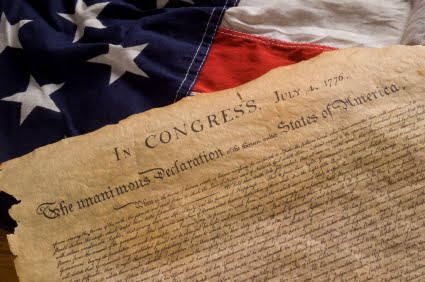Vol. 1 Issue 6
The Religion of Peace
Individual Moslems may show splendid qualities, but the influence of religion paralyses the social development of those who follow it. No stronger retrograde force exists in the world. Winston Churchill (1899)
Perhaps no other American President has spoken of the Muslim faith as George W. Bush. He confronted the challenges created by the inevitable conflict between Islam and American Liberty. His foreign policy in the Middle East was predicated upon the spread of democracy. He once said:
"If liberty can blossom in the rocky soil of the West Bank and Gaza America
Democratic government owes its origin “to a thousand years of European history, and beyond that by Europe 's double heritage: Judeo-Christian religion and ethics; Greco-Roman statecraft and law. No such system has originated in any other cultural tradition; it remains to be seen whether such a system, transplanted and adapted in another culture, can long survive.” American foreign policy is predicated upon the emergence of an Islamic democracy. It must be a form of government that is compatible with Islamic historical, cultural, and religious traditions. Such government must be capable of fostering individual freedom and human rights in a manner consistent with the free societies of the West.
History has shown that democracy and religious intolerance are generally incompatible. To Islamic fundamentalists, Jeffersonian Liberty is an anathema to their understanding of their faith. Government is not a creation of man to protect God given liberty. On the contrary, to these Muslims the Islamic state is seen as a theocracy. Legitimate authority comes from Allah alone, and Islamic rulers derive power not from the consent of the governed but from Allah as interpreted from the writings contained the Qu’ran. Since the ruler’s power is not derivative of the people, there is no need for a functioning legislative body or independent judiciary. Since these Muslims assume their ruler is submitting to the will of Allah, it would be an apostasy for members of a representative assembly to object or for a judge interpret a law against some constitutional standard.
Historically Muslim governments take on a personal character based upon the acquiescence of an assemblage of family, tribes and ethnic groups, connected by Islam and geographical happenstance. Nations of the Middle East are creations of European treaties and have little historical or ethnic origin from which a political state would arise. History shows that leaders of Muslim nations remain in power so long as they maintain the illusion that they are submitting to the will of Allah. Their rule is seen as a revelation of Allah to the people and those in opposition to be enemies not just of the government but of Allah.
.
The hope for liberty for those shackled within Islamic societies rests in the secularization of their world occasioned by the technological advances of the information age. In an increasingly flat world, foreign policy can no longer be centered solely on the establishment of relationships with Islamic autocracies by whatever means available. Neither can the seeds of liberty planted among people of the Middle East be neglected. The prospects of freedom to those trapped behind the Islamic Curtain of intolerance and ignorance can be fostered by the various modalities of the informational age. Fundamentalist Islam will remain an impediment to liberty. Aspects of Islamic Shania Law are cruel, misogynist and dangerous to a free society. Indifference to the plight of people subjected to this system is morally irresponsible and geopolitically suicidal. The defense of liberty is no vice to be shunned nor should moderation in the face of evil be tolerated by a free society. "Bad men cannot make good citizens. It is when a people forget God that tyrants forge their chains. A vitiated state of morals, a corrupted public conscience, is incompatible with freedom. No free government, or the blessings of liberty, can be preserved to any people but by a firm adherence to justice, moderation, temperance, frugality, and virtue; and by a frequent recurrence to fundamental principles." (Patrick Henry) Islamic fundamentalism is a serious threat to liberty and must be resisted by every means available. To these Muslims, democracy is irrelevant except that it may prove to be a means to an end. They may be willing to exploit the opportunities that a self-proclaimed democratic system offers through elections. Their attitude toward such elections has been summed up as "one man, one vote, once." Once political power has been obtained, their contempt for democracy will be unveiled and a theocratic autocracy will be established.
